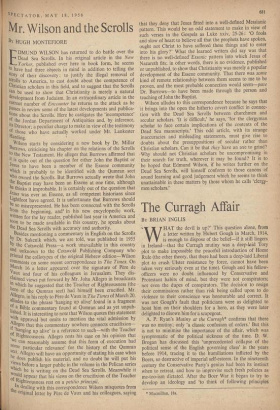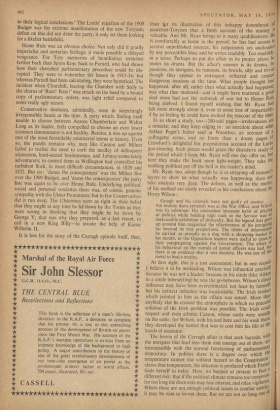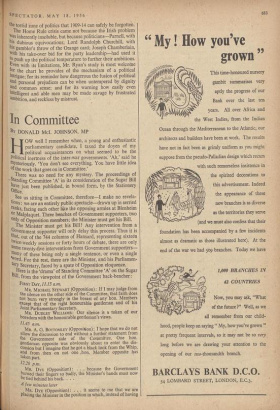The Curragh Affair
BY BRIAN INGLIS W • HAT the devil is up?' This question alone, from a letter written by Hubert Gough in March, 1914, is enough to dispose of the belief—if it still lingers in Ireland—that the Curragh mutiny was a deep-laid Tory plot to make impossible the peaceful introduction of Home Rule (the other theory, that there had been a deep-laid Liberal plot .to crush Ulster resistance by force, cannot have been taken very seriously even at the time). Gough and his fellow- officers were no doubt influenced by Conservative and Protestant habits of mind, but they were not conspirators; not even the dupes of conspirators. The decision to resign their commissions rather than risk being called upon to do violence to their conscience was honourable and correct. It was not Gough's fault that politicians were as delighted to hoist him on their shoulders for a hero, as they were later delighted to disown him for a scapegoat.
A. P. Ryan's Mutiny at the Curragh* confirms that there was no mutiny; only 'a classic confusion of orders.' But this is not to minimise the importance of the affair, which was symptomatic of the political sickness of the time. D. W. Brogan has discussed this 'unprecedented collapse of the political sense of the English governing class' in the years before 1914, tracing it to the humiliations inflicted by the Boers, so destructive of imperial self-esteem. In the nineteenth century the Conservative Party's genius had been its instinct when to retreat, and how to improvise such fresh policies as me-too-ism dictated. After the Boer War it began to try to develop an ideology and 'to think of following principles * Macmillan. 18s. to their logical conclusions.' The Lords' rejection of the 1909 Budget was the extreme manifestation of the new Toryism; defeat on this did not deter the party, it only set them looking for a likelier battlefield.
Home Rule was an obvious choice. Not only did it gratify imperialist and sectarian feelings; it made possible a delayed vengeance. For Tory memories of humiliation stretched farther back than Spion Kop; back to Parnell, who had shown how their cherished parliamentary procedure could be dis- rupted. They were to remember his lesson in 1913-14; but whereas Parnell had been calculating, they were hysterical. The incident when Churchill, leaving the Chamber with Seely to the chorus of `Rats! Rats!' was struck on the head by a bound copy of parliamentary orders, was light relief compared to some really ugly scenes.
Conservative destinies, admittedly, were in surprisingly irresponsible hands at the time. A party which, finding itself unable to choose between Austen Chamberlain and Walter Long as its leader, feels compelled to choose an even lower common denominator is not healthy. Besides, it was up against one of the most formidable ministerial teams in history. Even so, the puzzle remains why men like Curzon and Milner failed o realise the need to curb the medley of delinquent aristocrats, hard-seated businessmen, and Johnny-come-lately adventurers; to control them as Wellington had controlled his turbulent flock, in more difficult circumstances, in 1829 and 1832. But no: `damn the consequences' was the Milner line over the 1909 Budget, and `damn the consequences' the party line was again to be over Home Rule. Underlying political, social and personal vendettas there was, of course, genuine sympathy with the Ulster Protestants; but in few Conservatives did it run deep. The Ulstermen were as right in their belief that they might at any time be letdown by the Tories as they were wrong in thinking that they might be let down by George V; that was why they prepared, as a last resort. to , call in a new King Billy—to invoke the help of Kaiser Wilhelm Il.
It is less for the story of the Curragh episode itself, then, than f,pr its illustration of this 'unhappy downthrust of anarchist-Toryism that a fresh account of the mutiny is valuable. And Mr. Ryan brings to it many qualifications. fie is comfortably at home in the period; he has had access te several unpublished sources; his judgements are unclouded by any perceptible bias; and he writes readably. Too readablY, in a sense. Perhaps to put the affair in its proper place. he mutes its drama. But the affair's essence is its drama. Its, passions, its intrigues, its rumours, its brawls, silly and trivial though they appear in retrospect. reflected and created dangerous tensions at the time. What people thought had happened, after all, rather than what actually had happened, was what then mattered—and it might have mattered a great deal more had not the outbreak of war led to Home Rule being shelved. 1 found myself wishing, that Mr. Ryan had felt more strongly about it, even at some loss of impartialitY, if by so feeling he could have evoked the rancour of the tirne. In so short a study, too-200-odd pages—irrelevancies are a mistake; and they keep edging in : an' anecdote about what Arthur Paget's father said at Waterloo; an account of a, suffragette scene; and no fewer than a dozen pages 61 Crawford's delightful but preposterous account of the Larne, gun-running. Such pieces would grace the discursive study 01 the period which 1 hope Mr. Ryan will one day offer us; but here they make the book • seem light-weight. They take the seething political pot off the boil in the reader's mind. Mr. Ryan too, adept though he is at stripping off rumour's layers to show us what actually was happening, does net take analysis very deep. The defects, as well as the merits. of his method are nicely revealed in his conclusions about Sit Henry Wilson : Gough and his colonels were not guilty of mutiny. • ' but mutiny there certainly was at the War Office, and Wilson was its salesman. His unabashed incessant habit of plaYing at politics while holding high rank in the Service was all inexcusable exhibition of disloyalty. But the legend that gel up around him magnified the effectiveness of his intrigull„g far beyond its true proportions. The titbits of informatl°,: he carried, as proudly as a dog with a shopping basket ,!0 his mouth, to the Opposition leaders were useful to them.111, their campaigning against the Government. The effect o' his behaviour on the morale of junior officers was bad, bill: there is no evidence that it was decisive. He was not of t''' metal to lead a mutiny. At first sight, this is a just assessment; but in one respect believe it to be misleading. Wilson, was influential preciselY because he was not a leader; because in his circle (like Aitken, in a circle intersecting) he was the go-between. Wilson's dire influence may have been overestimated, not least by himself; but his indirect influence was incalculable.* The Irish instinct which pointed to him as the villain was sound. More thut! anybody else he created the atmosphere in which no peaoefilil solution of the Irish problem was possible. The Irish co& respect and even admire Carson, whose cards were usuallY on the table; for Wilson, with his nod here and his wink there. they developed the hatred that was to cost him his life at the hands of assassins. The lesson of the Curragh affair is that such hatreds, with the intrigues that lead into them and emerge out of then a re incompatible with the normal functioning of parliamehta,5„ democracy. In polities there is a degree over which temperature cannot rise without hazard to the Constitution: above that temperature, the situation is produced which France finds herself in today. Here, we happen at present to face,lie different risk: that if the political climate remains too tempera` for too long the electorate may lose interest, and relax vigilance' Where there are not enough political issues to combat apathYi it may be wise to invent them. But we arc not so long out ° the torrid zone of politics that 1909-14 can safely be forgotten. The Home Rule crisis came not because the Irish problem Was inherently insoluble, but because politicians—Parnell, with his dubious equivocations; Lord Randolph Churchill, with his gambler's throw of the Orange card; Joseph Chamberlain, With his take-over bid for the party leadership—had used it to push up the political temperature to further their ambitions. Even with its limitations, Mr. Ryan's study is most welcome for the chart he provides of the mechanism of a political intrigue; for its reminder how dangerous the fusion of political and personal prejudices can be when untempered by dignity and common sense; and for its warning how easily even Intelligent and able men may be made savage by frustrated ambition, and reckless by mistrust.




































 Previous page
Previous page